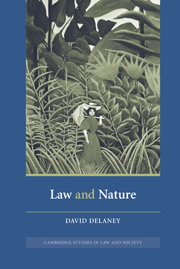Book contents
- Frontmatter
- Contents
- Acknowledgments
- Part I Situating nature
- Part II Rendering nature
- 6 It's a slippery slope: law and the forces of nature
- 7 Doctrinal wilderness and the path of interpretation: law and wilderness
- 8 Wild justice and the endangerment of meaning: law and endangered species
- 9 Puka's choice: law and animal experimentation
- 10 Fear of falling: law and bestiality
- 11 The births of nature and tradition: law and reproductive technologies
- 12 Doctrinal mutations at the edge of meaning: law and genetic screening
- 13 Return of the beast within: law and biological criminal defenses
- 14 Controlling dreams: law and the involuntary medication of prisoners
- Part III Judging nature
- References
- Index
7 - Doctrinal wilderness and the path of interpretation: law and wilderness
Published online by Cambridge University Press: 22 July 2009
- Frontmatter
- Contents
- Acknowledgments
- Part I Situating nature
- Part II Rendering nature
- 6 It's a slippery slope: law and the forces of nature
- 7 Doctrinal wilderness and the path of interpretation: law and wilderness
- 8 Wild justice and the endangerment of meaning: law and endangered species
- 9 Puka's choice: law and animal experimentation
- 10 Fear of falling: law and bestiality
- 11 The births of nature and tradition: law and reproductive technologies
- 12 Doctrinal mutations at the edge of meaning: law and genetic screening
- 13 Return of the beast within: law and biological criminal defenses
- 14 Controlling dreams: law and the involuntary medication of prisoners
- Part III Judging nature
- References
- Index
Summary
INTRODUCTION
Paul Gruchow, writing in Boundary Waters: The Grace of the Wild, describes moments of a solo venture in the Boundary Waters Canoe Wilderness Area of northern Minnesota:
I launch my canoe, enter it, put down my paddle, pull against the water, and slide down forward into the unknown … I have been paddling since early morning. The muscles in my arms are weary; my legs, which I have alternately stretched and tucked under the seat of my canoe, are cramped; and I am hungry. I have passed through early mists down the winding Kawishiwi River, have glided so stealthily past a bull moose feeding on water plants in a marsh that I did not disturb his breakfast, have examined the residences of beavers, have admired the bloom of irises, have savored the melody of a white crowned sparrow, have made the acquaintance of a loon so near that I could peer into the startling scarlet of its eye, have threaded a bewildering maze of islands and ventured across open water in the dazzling glare of the high morning sun: I stop out of consideration for all that has transpired, that I might lock it in memory … [I] have vanished into the forest, taken a proper place in it. [I] stand there belonging, anointed with the heavenly, the homely, grace of wildness.
(1997, 23, 43–44, 71)These words are evocative, but they are, after all, only words. We cannot feel the ache or hear the sparrow. We do not vanish.
- Type
- Chapter
- Information
- Law and Nature , pp. 162 - 191Publisher: Cambridge University PressPrint publication year: 2003

